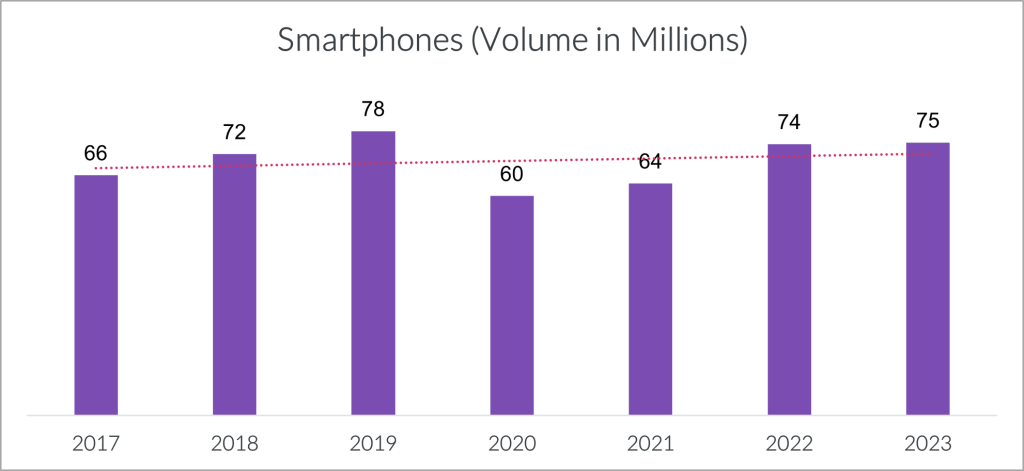Twenty years ago, if someone had taken out a new smartphone in a college canteen, restaurant, airport, or any public place and taken a selfie or checked email- heads would have turned, and necks would have craned. It would have been nothing short of a page 3 moment. Cut to 2023, this head-turning device is now considered as hygiene. Within 2 decades, we all have started to become a part of data sets with a digital trail which is used for generative AI and machine learning to create a significant impact in our lifestyles.
Smartphones and Gen Z
India’s smartphone revolution is a phenomenon characterized by rapid growth and widespread adoption. In just a few years, India has become the second-largest smartphone market in the world. In a country of 1.4 billion, 52% of the population is made up of millennials and Gen Z. This forms a significant dominant demographic group for smartphone brands and marketers in India. Within this, Generation Z, born between the mid-1990s and the early 2010s, is the first generation to grow up with smartphones as an integral part of their lives. The Gen Z population is estimated to be about 300 million in India and is expected to play a significant role in shaping consumer demand.
Since this is the first generation to grow up with the Internet as part of their daily lives for shopping, working, and socializing, they have a digital life where they seek representation. Unlike millennials and older age groups, Gen Z values self-expression. Today consumers turn to the internet when looking for any kind of information, including news and reviews prior to making a purchase. They toggle between sites, apps, and social media feeds, each one forming a different part of their online ecosystem. Having grown up with social media, Gen Z curates their online selves more carefully than those in prior generations have, looking for more personalized feeds, and an online presence as they consume media online.
Why Smartphones
Gen Z uses different screens: smartphones, tablets, laptops, TVs, and desktops. According to an IBM study, 75% of Gen Z selected their smartphones as their device of choice. We are a mobile phone country first with an installed base of 650 smartphones which is the highest for all the screens. The portability and form factor acts as a bonus for smartphones which makes it the preferred choice for consumers. This coupled with one of the cheapest data costs in the world makes India one of the fastest-growing smartphone markets in the world.
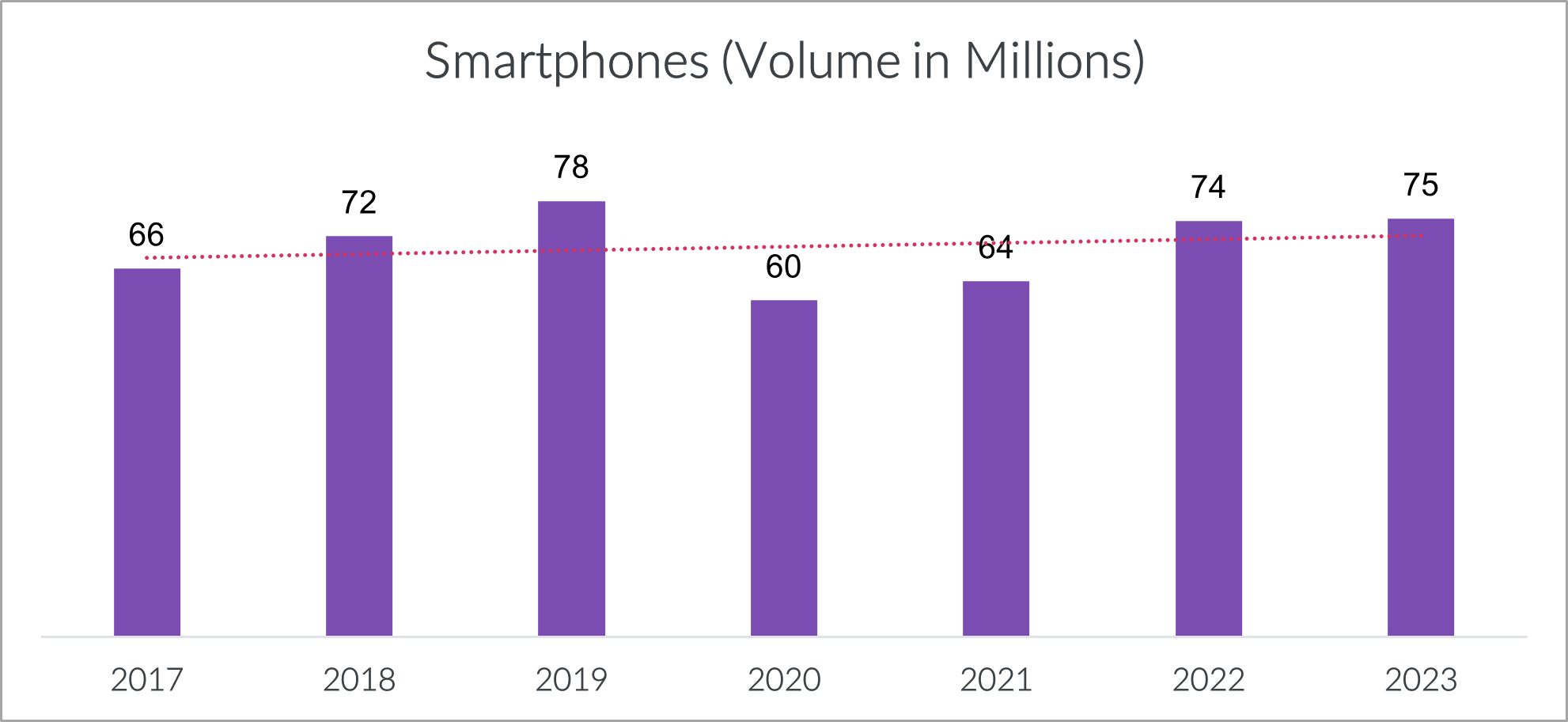
Source: GfK Market Intelligence, Offline POS Tracking | Jan to September 2017 v/s Jan to September 2023
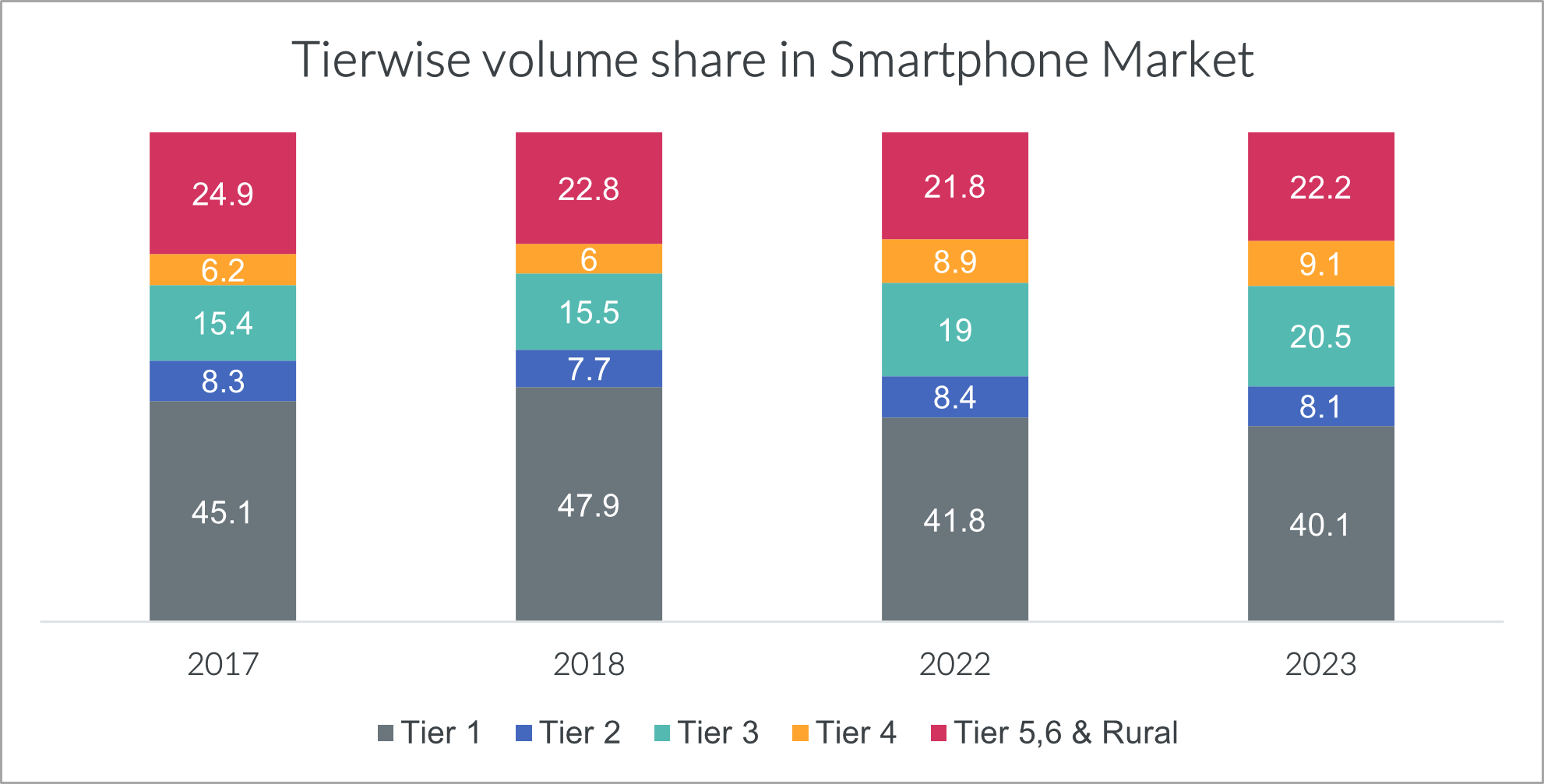
Source: GfK Market Intelligence, Offline POS Tracking | Jan to September 2017 v/s Jan to September 2023
Role of Artificial Intelligence in Smartphones
AI has emerged as a game changer in the world of smartphone technology. As per GfK’s Consumer Life Report which measures consumer lifestyle trends – 62% of Indian Consumers want technology that knows them and can make recommendations. Consumers want intelligent tech and that is where AI and generative AI play a crucial role in smartphone technology. From personalized recommendations to intelligent voice assistants, AI is deeply ingrained in the Indian smartphone experience. Some of the key areas where AI plays a role in our smartphones are
- Personalisation
- Voice Assistance
- Camera Enhancements
- Language Support
- Predictive text input
- Health and Wellness
And it blends into the usage of smartphones by Gen Z. Some of the key uses of smartphones where AI now plays a very important role are in the realm of
- Content Creation: This is a generation of content creators. They leverage AI-driven photo and video editing tools to produce high-quality content for platforms.
- Learning: Ai-powered educational apps and platforms are transforming the way Gen Z students learn. These apps offer personalized lessons, assessments, and instant feedback. Post-pandemic, this has gained more significance, especially in the wake of always on the move lifestyle.
- Social Media: AI algorithms shape the content and advertisements that Gen Z sees on their social media feeds. This generation actively participates in trends, challenges, and influencer culture on platforms.
- Shopping: Consumers are increasingly using AI-driven e-commerce platforms to discover and purchase products. Features like visual search and product recommendations play a vital role in their shopping experience.
- Entertainment: Whether it is content that one watches or music one hears, what we hear and watch shapes what one further uses for entertainment. AI helps to curate personalized music through music apps on smartphones.
How is this impacting Smartphone features in India
According to GfK Consumer Life Report, “It is better to buy well-known brands because you can rely on Quality” – 45% of Indian Urban consumers surveyed who agreed with this were GenZ.
As consumers, especially Gen Z, and millennials consume more and more data and use smartphones for complex daily tasks, the feature sets used in smartphones are also evolving. This is keeping brands on their toes as they try to understand consumer usage and try to answer the big question- which are the perfect set of features in a product? From the basic form factor of smartphones: Bar, Flip, or Fold to where important buttons on a smartphone should be placed in order for the user to reach them directly with one thumb, to the optimum screen size for the full experience, every feature on a smartphone becomes very important in order to maximize usage.
Product features and design play a critical role in the buying decision of a smartphone. This has led to an increase in high-performance features of cameras, RAM, fast charging, etc. in smartphones. To give an example, an average smartphone today carries 100 times more computing power than the lunar module of Apollo 11 in 1969.
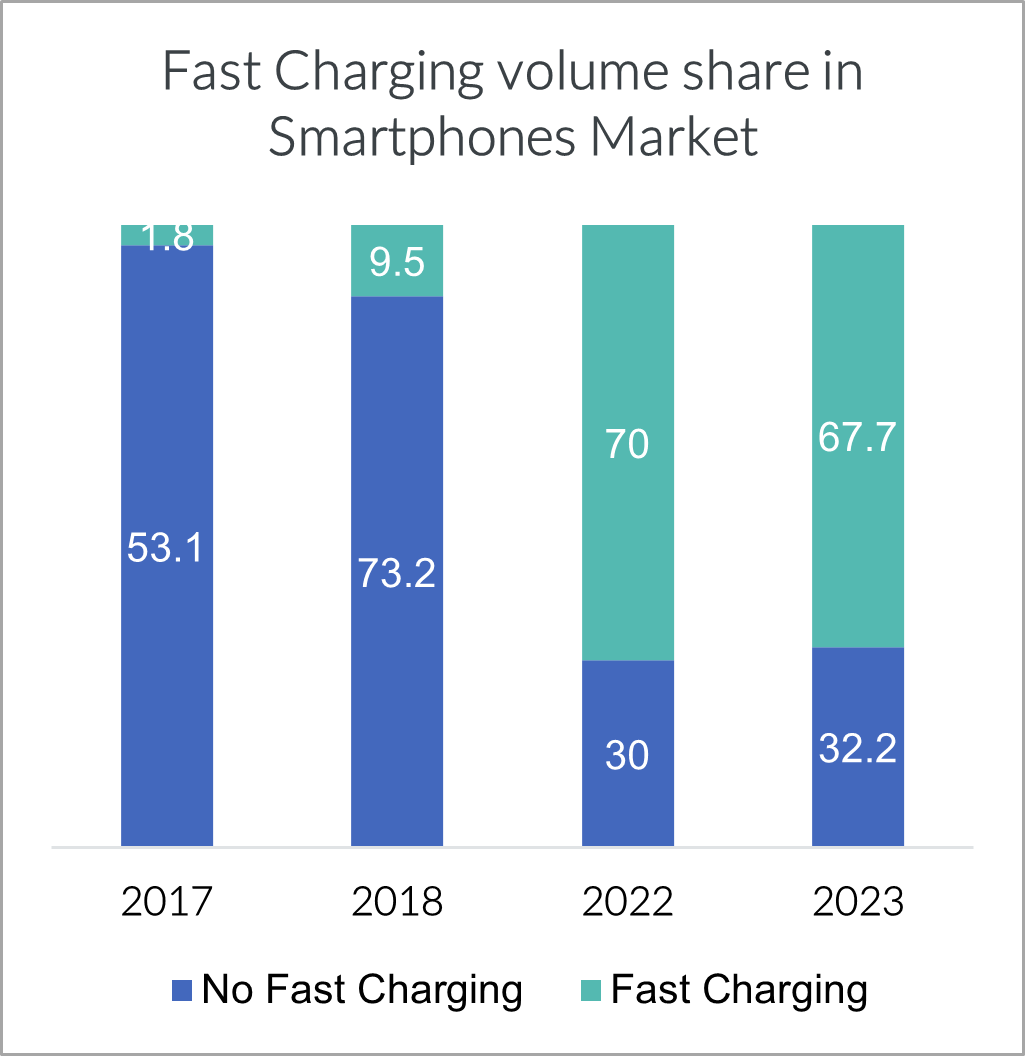
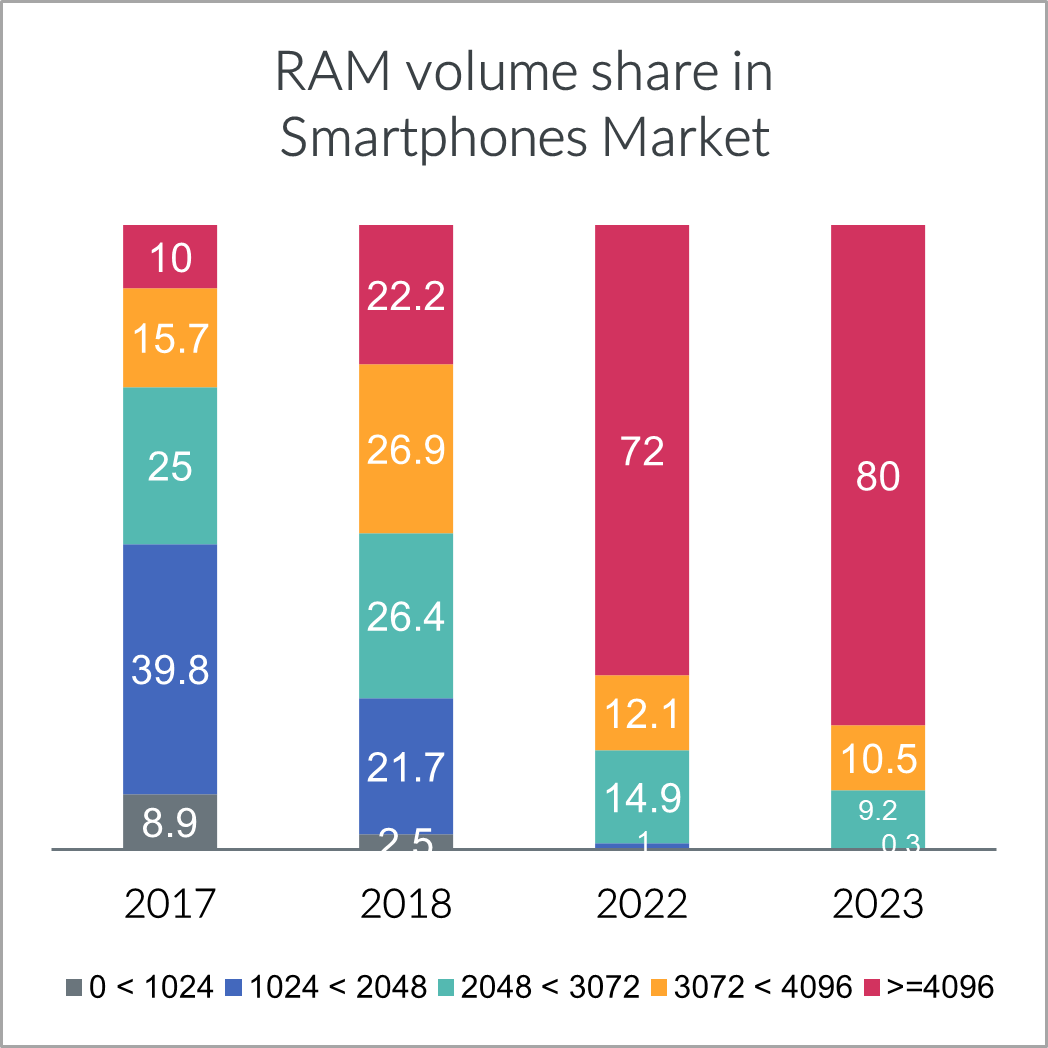
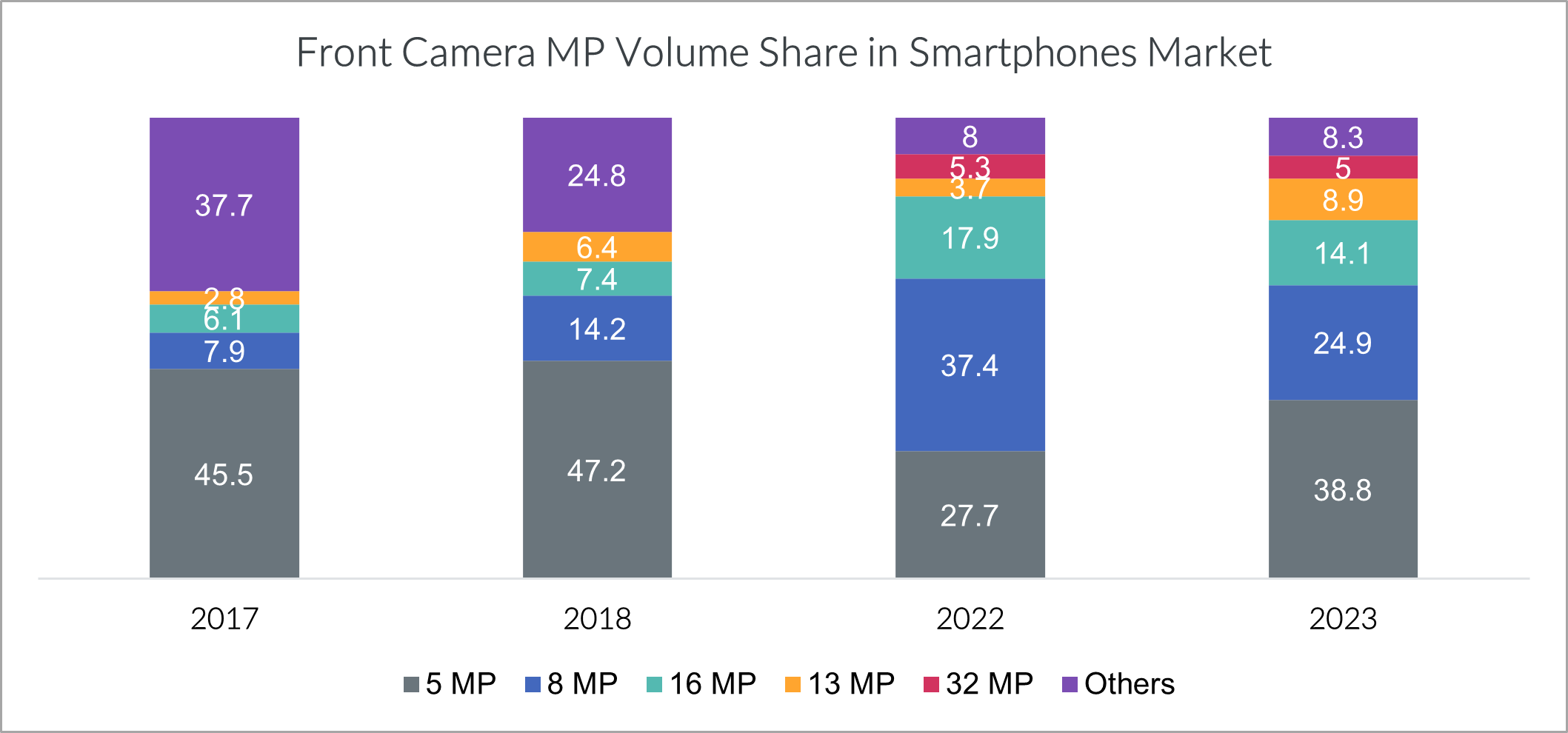
Source: GfK Market Intelligence, Offline POS Tracking | Jan to September 2017 v/s Jan to September 2023
The 5G network is poised to make a sweeping change in how consumers use smartphones and what they use them for. Gen Z will be the focus segment for 5G devices and networks since this will complement their lifestyle and usage of smartphones. As operator networks get geared up for 5G, we see brands already launching 5G-compatible devices. As per GfK Market Intelligence, Point of Sales Offline Retail Tracking for India, the contribution of 5G devices is ~40% in the offline market and is expected to peak by the end of 2024. The very fact that the switch to 5G devices in the market is faster than the switch from 3G to 4G tells us about the critical role being played by GenZ in driving the usage of smartphones and its ecosystem.
In short, the new smartphones are powerhouses which are literally a window to the world to today’s user.
With such powerful devices and intelligent tech to help today’s Gen Z, what can go wrong? Many things.
Understanding the consumer and Challenges of using AI
The reason why AI has been so effective till now is that we have large data sets of usage in the digital world and engineers have been able to feed this to AI systems for them to understand, learn, and then come up with solutions that make life easier for consumers. However, there are still challenges that brands and marketers face:
- Privacy: The use of consumer data has raised many concerns about privacy, especially with Gen Z.
- Sustainability: As we use more powerful processors, more RAM, and batteries, smartphones start producing more electronic heat which adds to Global warming. Effective recycling of smartphones is still a big concern. For Gen Z this is a touchy topic and hence sustainability becomes very important for them.
- Identifying Trends: One of the important trends identified with Gen Z is their trait of embracing their unique self and challenging norms more than any of the previous generations. This raises challenges for marketers since this means it is difficult to study their trends. What hampers marketeers is also the fact that there are not enough Gen Z marketeers.
- Cultural Sensitivity: The unique nature of India also means that cultural sensitivity becomes very important.
As we come out of the pandemic and move into the next level of growth for smartphones in India, the question that would come is what’s next for smartphones, what part will Gen Z play in this, and the role of AI.
What’s Next for Smartphones?
As mentioned before, smartphones are a consumer’s window to the world. What this means is that it also becomes one of the most important touchpoints for marketers and brands. Let’s look at some of the key parameters that would be instrumental in driving smartphone growth and usage in India in the next 5 years:
- Feature Phone shift: India still has a huge base of 250 million feature phones which will shift to smartphones. A large chunk of this shift will be influenced by GenZ as their online-first lifestyle will drive this change. This will give marketers an opportunity to tap into this segment.
- Growth Driven by Lower tiers: in the last few years we have seen growth in smartphones being driven by Tier 3 and lower tiers, including rural as tele density in Rural India grows. Today there are more internet users in Rural India than in urban due to the ratio of the population. The growth in Rural is led by changes in the aspirations of GenZ and millennials and increasing affordability in ownership of a device.
- 5G shift: As chip manufacturers and brands are ramping up production of 5G devices, the cost of 5G phones is also reducing, making it more affordable to consumers.
- Use of AI: The use of AI in smartphone apps is helping Gen Z to create more and better content and aiding them to make better decisions in their busy lives.
- Performance features: With the changing usage of smartphones, there will be an increasing use of performance features like better camera, RAM, fast charging, etc which will play a significant role in shaping up growth and usage of smartphones.
With India poised to become the world’s largest smartphone market in the near future, the role of India’s youth and AI will be very critical and will play a key role in shaping this industry. As AI becomes a part of our lives, don’t be surprised if the suggestion of your next smartphone comes from an AI.
